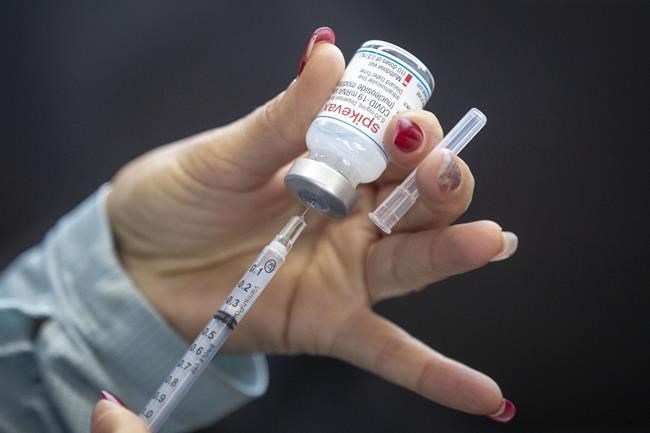OTTAWA — American vaccine maker Moderna will announce Friday it intends to build its promised Canadian production facility in Montreal.
Mayor Valérie Plante confirmed the news in a scrum with reporters Thursday.
"I'm very proud of the City of Montreal's work (on the file)," she said.
Prime Minister Justin Trudeau, Moderna CEO Stéphane Bancel and Quebec Premier François Legault are all expected to be on hand for the reveal in Montreal Friday.
In a statement Thursday, Moderna said only that it is "still finalizing an agreement to construct a biomanufacturing facility in Canada."
Moderna signed an initial agreement with the Canadian government last August to bring such a factory to Canada with the details on where to be worked out.
"I believe that this technology can allow Canada to be ready for the next virus," Bancel said in August at the announcement, which also took place in Montreal.
The Canadian agreement includes both production and vaccine research components with the building to be completed by 2024.
Bancel said last summer that the design for the facility was already complete and Moderna just needed to select a site. That decision would largely depend on the availability of trained workers, he said.
Canada's biomanufacturing industry has declined starkly in the last two decades but what remains of it is heavily centred in Quebec and the Greater Toronto Area. Both were in the running for this plant.
The planning agreement with Canada has not been made public but Bancel said last year the agreement ensures Canada gets priority access to doses produced there, and allows Canada to ask Moderna to shift production lines to respond to a new or emerging threat.
Before COVID-19, Moderna was a small vaccine startup based in Cambridge, Mass., working on bringing an mRNA vaccine to market. It did not have its own commercial production capacity and contracted with Swiss firm Lonza to make its vaccines at first.
Its COVID-19 vaccine is its first authorized product but it now has more than two dozen others in various stages of research, including mRNA vaccines for influenza and respiratory syncytial virus, or RSV.
Moderna has grown from a company with 830 employees and annual revenues of $60 million in 2019 to one with more than 2,700 employees and $18.5 billion in revenue in 2021.
Canada's biomanufacturing industry declined substantially in the last 40 years and when COVID-19 vaccines were needed, no facility in Canada was immediately able to make them.
It meant Canada was entirely reliant on imported vaccines, and in some cases had to pay more to get them faster.
The federal government said they wanted to change that and has invested more than a billion dollars to expand or build new vaccine facilities in Canada.
Resilience Biotechnology received $200 million to expand its biomanufacturing facility in Mississauga, Ont., so it can make as many as 640 million doses of mRNA vaccines a year.
The National Research Council built a $126-million vaccine plant in Montreal, which was supposed to start making doses of the Novavax vaccine by the end of 2021. The plant is finished but production lines aren't yet rolling as the building undergoes lengthy quality assurance procedures.
Another $173 million went to Medicago in Quebec to help it develop a COVID-19 vaccine and expand production capacity. That vaccine was authorized by Health Canada in February and the new plant is still in construction.
Sanofi Pasteur is getting $415 million from Ottawa to build a new flu vaccine facility in Toronto.
Innovation Minister François-Philippe Champagne said this week Canadians should feel better knowing at the start of the pandemic Canada could produce about 30 million doses a year, and now it's closer to 600 million.
"So we are in a much better position than we were," he said.
In August, Champagne bragged that Canada was the first country outside the U.S. where Moderna would be building a vaccine plant.
But Moderna announced a similar agreement with Australia in December, and the details and location for that site were already made public in March.
The Australian plant to be built in Melbourne will make up to 100 million doses and be in production as early as 2024. It was called a 10-year, multi-billion dollar deal between the company and Australia but no specific details on costs were provided for commercial secrecy reasons.
This report by The Canadian Press was first published April 28, 2022.
— with files from Stéphane Blais in Montreal.
Mia Rabson, The Canadian Press



